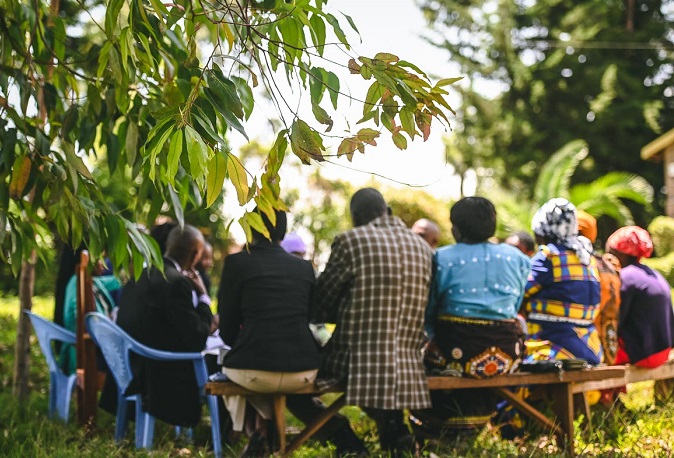UNODC Eastern Africa News and Stories
You are here: Home / News
Progress check on Kenya's "policy of the people"
 21 June 2022, Nairobi - Almost two years after the launch of Kenya’s Alternative Justice Systems (AJS) Policy, hundreds of stakeholders who helped shape the so-called “policy of the people” are gathering to review progress with its implementation.
21 June 2022, Nairobi - Almost two years after the launch of Kenya’s Alternative Justice Systems (AJS) Policy, hundreds of stakeholders who helped shape the so-called “policy of the people” are gathering to review progress with its implementation.
UNODC is a key partner supporting the 1st Annual AJS Conference in Nairobi at which state and non-state actors are also discussing and documenting the many experiences and processes that may be used to advance access to justice for citizens through AJS, as envisioned in the policy.
Alternative justice processes are capable of reducing the burden on courts and of strengthening the links between formal and informal justice systems, rather than replacing reliance on courts.
The two-day conference being staged by the Judiciary and its National AJS Steering Committee was opened today by Kenya’s Deputy Chief Justice, Lady Justice Philomena Mbete Mwilu.
 “Always cognisant of the fact that most disputes are not resolved through the formal justice system, the Judiciary itself must learn from these ‘alternative’ systems and techniques that, to significant extents, make the justice they dispense more organic and permeating. The discursive techniques they implement, the responsiveness to contextuality, their appreciation of more holistic ideas of justice and a more complete consideration of both the individual and the community are a few areas from which the Judiciary can seek to improve its justice practices,” Lady Justice Mwilu said.
“Always cognisant of the fact that most disputes are not resolved through the formal justice system, the Judiciary itself must learn from these ‘alternative’ systems and techniques that, to significant extents, make the justice they dispense more organic and permeating. The discursive techniques they implement, the responsiveness to contextuality, their appreciation of more holistic ideas of justice and a more complete consideration of both the individual and the community are a few areas from which the Judiciary can seek to improve its justice practices,” Lady Justice Mwilu said.
“On the other hand, basic constitutional tenets of equality, fair procedure, representation, non-discrimination, well-entrenched and enunciated in formal justice provision, must receive more deliberate attention across AJS mechanisms and practices,” Deputy Chief Justice Mwilu added.
Speaking at the conference, the Head of the Crime Prevention and Criminal Justice Pillar for UNODC in Eastern Africa, Ms Charity Kagwi-Ndungu, explained why reinforcing human rights through alternative, restorative and other informal justice mechanisms was of paramount importance for UNODC.
 “As the global guardian of UN standards in crime prevention and criminal justice, UNODC continues to take great interest in the AJS Policy and its application as it is cascaded to the county and community levels. This includes attention to aspects such as protection of the most vulnerable and respect for human rights,” Ms Kagwi-Ndungu said.
“As the global guardian of UN standards in crime prevention and criminal justice, UNODC continues to take great interest in the AJS Policy and its application as it is cascaded to the county and community levels. This includes attention to aspects such as protection of the most vulnerable and respect for human rights,” Ms Kagwi-Ndungu said.
“AJS is one means of meeting the high expectations of citizens for equitable justice, consistent with the spirit of Kenya’s Constitution which is why we are pleased to have partnered with the Judiciary for almost four years in the process of developing, and now operationalizing this policy, alongside the European Union.
“We look forward to continuing our support for the full adoption of the AJS Policy in pursuit of peaceful communities and justice for all beyond the walls of state institutions,” Ms Kagwi-Ndungu said.
Rolling out the AJS policy includes the entire justice sector and therefore now fits under the National Council on the Administration of Justice (NCAJ), given the important coordination role of NCAJ.
The conference theme is ‘The Role of AJS in Accelerating Social Transformation through Access to Justice’, inspired by the Social Transformation through Access to Justice (STAJ) vision of Chief Justice Koome which promotes a multi-door approach in access to justice.
Other partners supporting the conference include the Federation of Women Lawyers (FIDA) Kenya, Pamoja Trust, International Commission of Jurists (ICJ), International Development Law Organization (IDLO), Legal Resources Foundation (LRF) and the co-implementer of PLEAD, namely the UN Development Programme.
Last month, UNODC was privileged to participate in the launch of the Nakuru AJS County Action Plan and Model – a first for the AJS Steering Committee and for Kenya. This County Action Plan features a home-grown model tailored for the specific context in Nakuru County and involves various layers of stakeholders.
 The AJS Policy serves as the inspiration and guide for the development of these tailored county-level plans, and UNODC is proving technical and logistical input to the Steering Committee to support this endeavour.
The AJS Policy serves as the inspiration and guide for the development of these tailored county-level plans, and UNODC is proving technical and logistical input to the Steering Committee to support this endeavour.
UNODC’s support is made possible with European Union funding through the Programme for Legal Empowerment and Aid Delivery in Kenya (PLEAD) – a partnership between the Government of Kenya, EU, UN and civil society that is improving the delivery of justice services, settlement of disputes and use of alternatives to imprisonment.
More information
- Email UNODC: unodc-plead@un.org
- AJS Kenya Steering Committee
- UNODC web story, 16 May 2022: Kenya's first county plan to mainstream customary justice
- UNODC web story, 27 August 2020: Partners welcome move to mainstream alternative justice systems in Kenya